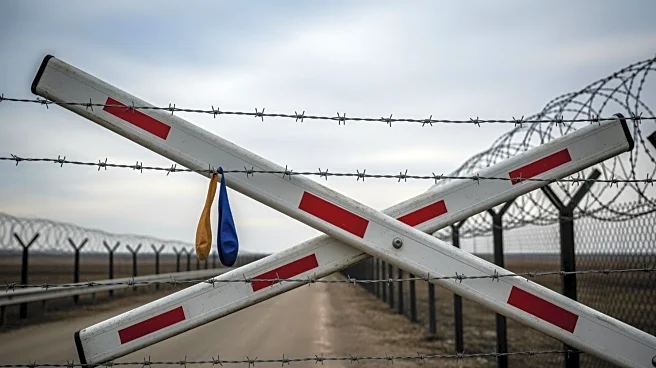What's Happening?
Lithuania has announced the extension of its border closure with Belarus for an additional month following incidents involving balloons used to smuggle cigarettes across the border. The decision comes
after repeated disruptions at Vilnius Airport, where air traffic was suspended due to balloon sightings. The Lithuanian government views these actions as deliberate provocations by Belarus, which is allied with Russia. The closure affects two border crossings, with Šalčininkai being completely closed and Medininkai near Vilnius allowing limited passage. Exceptions are made for some Lithuanian and EU citizens, as well as Russians with transit documents to Kaliningrad. Interior Minister Vladislav Kondratovic emphasized the need to send a strong message to Belarus, which has been accused of not addressing the issue.
Why It's Important?
The border closure highlights ongoing tensions between Lithuania and Belarus, exacerbated by Belarus's alliance with Russia. This situation underscores the broader geopolitical challenges in the region, particularly for NATO and EU member states like Lithuania, which are on the frontlines of Eastern European security concerns. The use of balloons for smuggling raises questions about the effectiveness of border security and the potential for similar tactics to be used for more nefarious purposes. The incident also reflects the heightened alert across Europe regarding airspace intrusions, as seen with recent drone activities that have tested NATO's response capabilities. The closure could impact trade and movement in the region, affecting local economies and cross-border relations.
What's Next?
Lithuania's decision to extend the border closure is likely to provoke further diplomatic tensions with Belarus. Belarusian President Alexander Lukashenko has already criticized the move as part of a 'hybrid war' against his country. The situation may lead to increased scrutiny and security measures along the border, as well as potential diplomatic engagements to address the underlying issues. European nations, particularly those in NATO, may also consider coordinated responses to similar provocations, ensuring that their airspace and borders are secure against unconventional threats.
Beyond the Headlines
The use of balloons for smuggling highlights a novel method of circumventing traditional border controls, which could inspire similar tactics elsewhere. This incident also raises ethical and legal questions about state responsibility and the measures needed to prevent such activities. The broader context of Russian influence in the region and its implications for NATO's strategic posture cannot be overlooked, as these developments may influence future policy decisions and military readiness.









